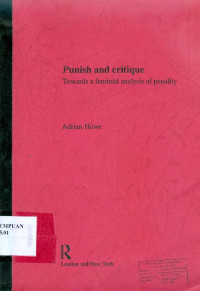
Text
Punish and critique: towards a feminist analysis of penalty
The main contribution of this book lies in its ability to force our thinking about penalty into confrontation with the idea of gender and with gendering practices of the late twentieth century. This book originally intended as a feminist equivalent to The New Criminology but in field of penology/penalty.In Punish and Critique, Adrian Howe makes a major contribution both to the literature on penality and to postmodem penal politics. Howe reviews the range of critical perspectives, Marxist, post structuralist and feminist, that have proliferated in the field of penology over the past twenty five years. This exegesis, however, is a means to an end: the second half of the book reflects Howe's concern to alter the ground of the debate, to effect a paradigm shift that will move the study of punishment to a consideration of the 'gendered characteristics of disciplinary procedures. Over the past twenty-five years, a range of critical - that is, Marxist, poststructuralist and, less frequently, feminist - perspectives has been brought to bear on the subject of punishment and, in particular, on the question of imprisonment in western capitalist societies. Considered together, these critical views constitute a formidable challenge to traditional ways of conceptualising punishment. Yet, for all the advances made, the new critical perspectives remain deeply flawed in a significant, but as yet barely acknowledged way - with very few exceptions they are profoundly masculinist. Punish and Critique begins the task of exploring what a theoretically-informed feminist analysis of penality might look like and, in the process, uncovers a series of disjunctions in the recent critical analyses - for example, disjunctions between social histories' of prison regimes imposed on men and feminist histories of the imprisonment of women. Most crucially, the book unveils radical disengagement between two current critical theoretical projects: the masculinist, analysing the emergence of punishment regimes in the context of the state's power to punish and the feminist, mapping the differential impact of disciplinary power on lived female bodies. In Punish and Critique Adrian Howe argues that a more fully social understanding of punishment must be informed by feminist research on women's imprisonment and by poststructuralist studies of the disciplining of women's bodies. Punish and Critique will be invaluable reading to all students, lecturers and professionals in criminology, women's studies and sociology and well as to those working in prisons and the probation
Availability
| KP.II-00165 | INT VII 45.01HOW p | My Library | Available |
Detail Information
- Series Title
-
-
- Call Number
-
KP.II.HOW p
- Publisher
- London : Routledge., 1994
- Collation
-
x, 252 hal.; 23cm
- Language
-
English
- ISBN/ISSN
-
0-415-05191-6
- Classification
-
KP.II.
- Content Type
-
-
- Media Type
-
-
- Carrier Type
-
-
- Edition
-
first published 1994
- Subject(s)
- Specific Detail Info
-
-
- Statement of Responsibility
-
-
Other version/related
No other version available
File Attachment
Comments
You must be logged in to post a comment
 Computer Science, Information & General Works
Computer Science, Information & General Works  Philosophy & Psychology
Philosophy & Psychology  Religion
Religion  Social Sciences
Social Sciences  Language
Language  Pure Science
Pure Science  Applied Sciences
Applied Sciences  Art & Recreation
Art & Recreation  Literature
Literature  History & Geography
History & Geography